Sex
The Most Frequently Searched Sex Questions in the U.S.
The results of billions of Google searches on sex terms are riveting.
Posted January 28, 2022 Reviewed by Kaja Perina
Key points
- Studies of human sexual behavior, such as the Kinsey Report, have relied on relatively small samples of the population.
- But now, with Google Trends, we can know what sex topics hundreds of millions of people are really interested in.
- We studied the trends of the 12 most Googled sex questions and the 22 most Googled sex terms in the US over the last few years.
- Some findings are as expected but others are surprising and even shocking.
Forty years ago, when I obtained my Clinical Sexology diploma in addition to my M.D. and Ph.D., I studied human sexual behavior, read the Kinsey reports, and studied the work of Masters and Johnson, but the samples in those studies were relatively small.
Now, with the internet, we have the possibility to know what hundreds of millions of people are really interested in, which is revealed by the way people search the internet. In the privacy of their home, the real needs and wants of people are exposed.
My husband and I were curious to know what sexual questions and terms people were frequently searching and if those searches had changed over the last few years, especially during the pandemic.
To find out, we used Google Trends to compare the volume of searches on different sex topics in the U.S. (Google Trends describes the relative search interest for different queries).
Here's what we found:
12 most Googled sex questions:
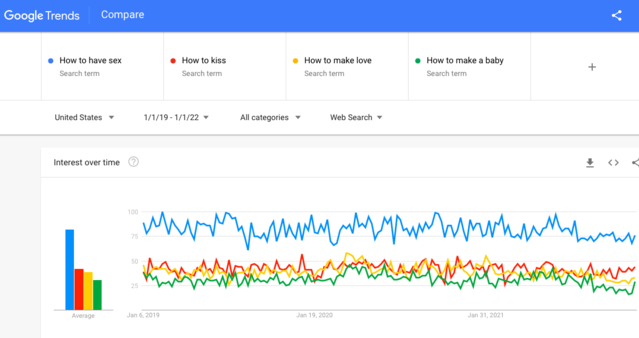
We found that, in the U.S., over the last three years from January 1, 2019, until January 1, 2022, the 12 questions people Googled the most, in decreasing popularity, were the following (to not overwhelm people with graphs, we only show above the graph of the top 4 questions):
1. How to have sex
2. How to kiss
3. How to make love
4. How to make a baby
5. How to masturbate
6. What is oral sex
7. How to give a blowjob
8. How to French kiss
9. Where is the G spot
10. How to touch a man
11. How to get an orgasm
12. How to touch a woman
Implications:
The fact that the number one and two sex questions Googled are “How to have sex” and “How to kiss” suggests that people really don’t know enough of the practical details of how to be sexually intimate with their partners. Indeed, there are books on sex, school sex education, and for some, parental education, but none of those is as detailed as what is found on the internet. Indeed, some sites offer practical, step-by-step advice that could be priceless for inexperienced people.
High up in the list is number five, “How to masturbate,” which is definitely not taught in school nor by parents. For women, knowing how to masturbate is key to knowing what their body likes, which in turn is key to guiding their sexual partner on how to take them to orgasm.
As far as differences before and during the pandemic, the graphs of historical search interest show that the relative interest among the different questions was stable with not much variation during the pandemic.
Next, after searching on the questions asked, we focused on the most searched sex terms.
22 most Googled sex terms:
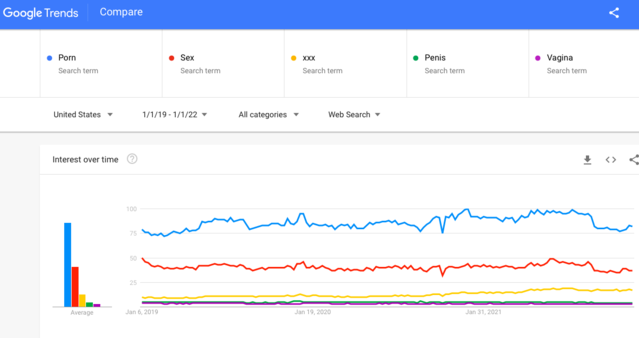
In decreasing order of popularity, the 22 most searched sex terms were the following (to not overwhelm people with graphs, we only show above the graph of the top 5 sex terms) :
1. Porn
2. Sex
3. xxx
4. Penis
5. Vagina
6. Blowjob
7. Threesome
8. STD
9. Gay sex
10. Bondage
11. Lesbian sex
12. Anal sex
13. Bisexual
14. Masturbation
15. Kinky
16. Sex positions
17. Clitoris
18. G spot
19. S&M
20. Sex education
21. French kiss
22. Foot fetishism
There were a few surprising findings:
1. Interest in "Bisexual"
When comparing searches on "Heterosexual," "Homosexual," "Transsexual," "Asexual," and "Bisexual," we saw that there is the most interest in “Bisexual” followed by “Asexual.” Searches on “Bisexual” peak the first week of June each year, which does not correspond to Bisexual Pride Day (September 23rd of each year) but might correspond to the gay pride week, with a peak that was less noticeable in 2020 compared to 2019 and 2021, possibly because of the gay pride cancellation due to the pandemic. More research is needed to analyze why searches on "Bisexual" increase the first week of June.
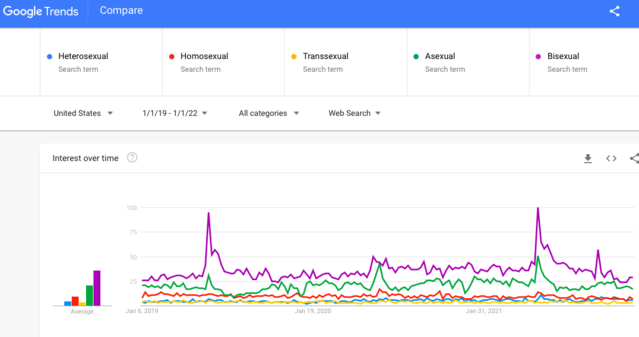
2. Searches on "Porn"
Previously listed were numbers from over the last three years, but what was the search trend on "Porn," "Sex," and "xxx" over the last 18 years? From 2004 to the present, the number of searches on "Porn" increased steadily from 2004 to 2013 to a peak in the summer of 2013, then decreased steadily until 2018, and have remained stable since then with no significant search increase on "Porn," "Sex," or "xxx" during the pandemic lockdown in 2020.
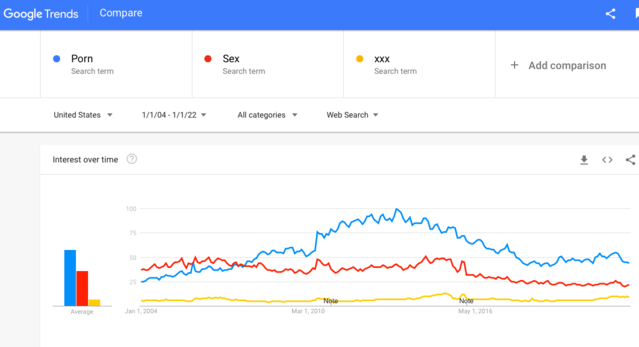
3. A shocking discovery
Also, over the last 18 years, searches for “Sex positions” have been decreasing, while searches for another new topic related to oral behavior described in the October 2021 edition of Men's Health, took off in 2013 and have been growing ever since. But since October 2021, there has been an increase in searches of “Sex positions,” possibly due to the fact that sex positions is one of the main topics of the October 2021 edition of Women's Health magazine and several other magazines.
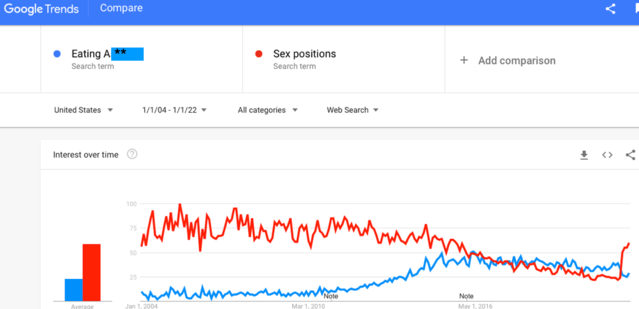
4. Bringing some humor
To bring a little perspective and humor in, it is interesting that the number of searches for “How to have sex” is similar to “How to cook rice,” although the interest in how to cook rice has been declining lately, whereas the interest in how to have sex remains constant.
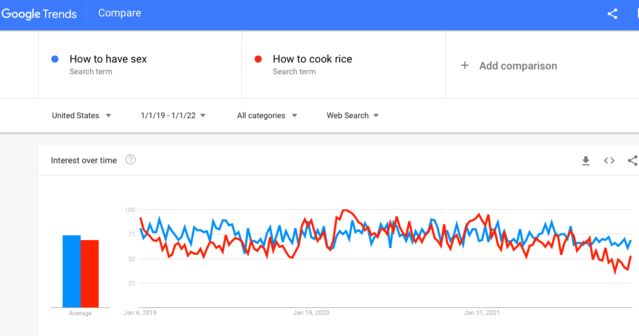
5. Bringing some perspective
The number of searches for “How to have sex” is much less than the search on “How to lose weight,” the latter being cyclical, increasing during spring and summers and decreasing in the winter.
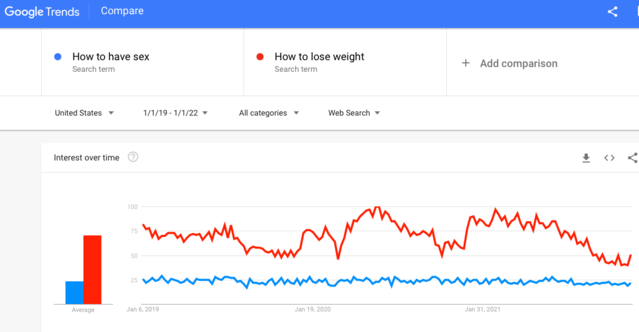
Conclusions:
- Google Trends can be a useful tool for behavioral research because—unlike published academic studies on sex that involved hundreds or thousands of subjects—the Google data represent hundreds of millions of people, at a minimum, giving candid insights into the sexual curiosity of a significant percentage of the population.
- Via Google searches, we can quickly identify new trends, new sexual behaviors that we wouldn't have been able to identify that quickly before.
- Via Google searches, we can also identify a need for better sexual education. Because the questions "How to make love" and "How to masturbate" are heavily searched and because those topics are not well addressed in class or by parents, there is clearly a need to change the way classes and parents do kids' sex education. Knowing "How to make love" will bring sexual satisfaction to new couples which, in turn, will be instrumental for happiness, balanced life, and good health. For women, knowing "How to masturbate" will help them guide their sexual partners to bring them to orgasm which is important for happiness.
- Our findings show that there are a lot of people searching on sex topics that used to be considered taboos. We used to marginalize those people, but given the large number of Google searches on those subjects, instead of marginalizing people, those different sex topics need to be discussed openly.
A lot of people might be reassured to learn that they are not unique, bad, deviant, or alone in what interests them and that there are many others just like them. Therapists also need to take this into account to help their clients deal with their insecurities, guilt, anxieties, and sometimes depression.
Because sexual satisfaction is an important part of health and life in general, it is key to know what people really need and want in intimacy so that there could be an open door to sexual exploration within a stable romantic relationship.
Note: Even though the results here are meaningful because they are based on billions of search events from millions of individuals, caution should be exercised in drawing conclusions solely from this work due to the limitations inherent in analyzing search volumes, such as sample biases (not everyone who's curious about sex searches Google for answers), lack of data on demographics (e.g., male vs. females), and other factors that make generalizing about human sexuality difficult.




